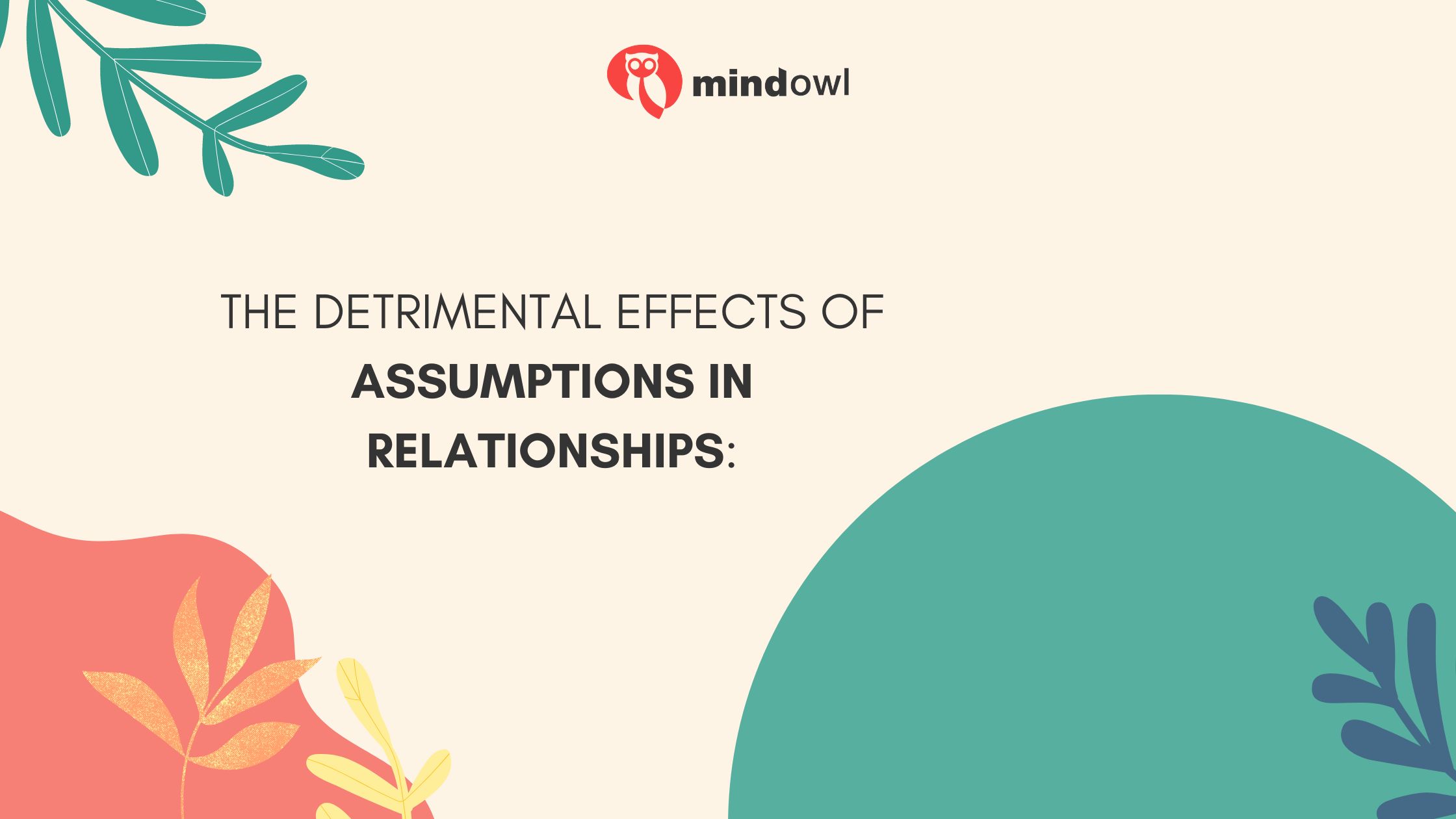
Has your relationship ever been thrown off track by misplaced assumptions? When left unchecked, these assumptive thoughts can undermine the foundation of even the strongest partnerships.
This article aims to unravel and address why we make assumptions in relationships, their impact and how we can overcome them. Ready to challenge those nagging doubts? Let’s clear the murky waters together.
Key Takeaways
- Assumptions in relationships can harm trust and communication, leading to misunderstandings and conflicts.
- Signs of making assumptions include acting on guesses as if they are true, misreading body language, and causing unnecessary stress.
- Lack of communication, past experiences/traumas, and insecurities/fears contribute to making assumptions in relationships.
- Overcoming assumptions requires self – reflection, open communication, giving the benefit of the doubt, and seeking professional help if needed.
Understanding Assumptions in Relationships
 Assumptions in relationships can have a negative impact and it’s important to understand their nature and signs.
Assumptions in relationships can have a negative impact and it’s important to understand their nature and signs.
The nature of assumptions
Assumptions happen. People guess what others think or feel. They do not check these thoughts with the person. Doing this, they often get it wrong. This is because people can’t read minds! In a couple, assumptions get made all the time.
It’s part of human nature, but can also hurt relationships badly. Some think of things that may not be true about their partner’s words or actions and see them as ‘facts’. This causes problems when those ‘facts’ are wrong.
Signs of making assumptions
There are a few signs that show you are making assumptions in a relationship. You might be:
- Acting on guesses as if they are true.
- Believing your partner knows how you feel without telling them.
- Misreading body language and creating your own story.
- Using passive actions that can hurt the bond between you two.
- Causing undue stress and drama based on your own made up notions.
- Ruining your relationship by acting on these baseless thoughts.
Negative impact on relationships
Assumptions in a relationship can harm it a lot. They build walls between people. These walls stop open communication. Trust and bond get lost this way.
Misunderstandings crop up due to assumptions as well. People think their partner knows how they feel without saying anything. Two people might see body language in two different ways too.
This leads to a lot of confusion and fights.
Guessing what the other person thinks or feels is also not good for the relationship. Every person has his or her own wants and needs. Guessing them wrong can make the person upset.
It may make them feel less important too.
Reasons for Making Assumptions in Relationships

One reason for making assumptions in relationships is the lack of communication.
Lack of communication
Not talking enough can cause problems. Couples make assumptions when they don’t share thoughts and feelings. It is easy to guess what a partner thinks or feels, but this often leads to mistakes.
Misunderstandings come from these mistaken guesses. This can even end relationships sometimes. So, it’s very important for every couple to talk more with each other. One must pay more attention to open communication in a relationship.
Past experiences and traumas
Bad things in the past can cause us to make assumptions in our relationships. The hurt and pain we felt before shape how we see things now. We may think that our partner will cheat or lie to us just like someone did in the past.
This view leads to guesswork and blame, harming couple’s intimacy.
Past traumas also make you assume the worst about your partner’s actions. It creates a dangerous trap where you judge every word and act without knowing all the details. Instead of open communication, fear makes us misunderstand their intentions behind certain behaviour.
So, it’s time for couples to challenge these harmful beliefs for healthier connections.
Insecurities and fears
Fears and insecurities play a big part in our lives. They can fill our minds with bad thoughts. Sometimes, we let these fears rule how we act in our love life. We might fear getting hurt or being left alone.
These worries can make us assume the worst about our partners. Our partner may say they need some space. Our fear might tell us that means they don’t love us anymore. But this is often not true at all! It’s just an assumption made from fear.
These false beliefs can harm good relationships if not checked.
Overcoming Assumptions in Relationships
To overcome assumptions in relationships, it is important to engage in self-reflection and become aware of our own thoughts and biases. Communicating openly and honestly with our partner, giving them the benefit of the doubt, and seeking professional help if needed can also be effective strategies.
By actively working on overcoming assumptions, we can build healthier and stronger relationships. Read more about how to overcome assumptions in relationships here.
Self-reflection and awareness
Self-reflection and awareness are crucial in stopping us from making assumptions in a relationship. They let us see our own thoughts and feelings clearly. This helps stop the dangerous trap of assuming things about our partner’s words or actions.
Confirmation bias can lead to misunderstanding, so we must check ourselves. We should not guess what the other person thinks or feels. Instead, we need to ask them openly for clarification.
If you find yourself always assuming the worst, it may signal that it’s time for self-care and positive change.
Open and honest communication
Open and honest communication is vital for building strong relationships and overcoming assumptions. When we communicate openly, it means that we share our thoughts, feelings, and concerns with our partner without holding back or hiding anything.
By doing this, we create a safe space where both partners feel comfortable expressing themselves without fear of judgment or rejection. Additionally, open communication allows us to address any misunderstandings or incorrect assumptions that may have arisen in the relationship.
It helps us clarify things, gain a better understanding of each other’s perspectives, and work together towards finding solutions. Remember, when we communicate honestly and openly, we foster trust and strengthen the bond between partners.
Giving the benefit of the doubt
Giving the benefit of the doubt is an important step in overcoming assumptions in relationships. It means thinking the best of someone when there could be multiple possibilities. Instead of assuming the worst, it involves considering that there may be other explanations for their words or actions.
This can help improve relationships and how individuals feel. By giving the benefit of the doubt, we open ourselves up to understanding our partner’s intentions and feelings, rather than jumping to conclusions based on limited information.
It allows us to approach situations with empathy and compassion, fostering trust and mutual understanding in healthy relationships.
Seeking professional help if needed
If negative assumptions in your relationship are causing significant distress and impacting your relationship, it may be beneficial to seek professional help. Couples counseling can provide a safe space for both partners to communicate more effectively and work through their assumptions.
Research shows that couples often wait 4-6 years before seeking help, but waiting too long can prolong the issues and make them harder to overcome. By reaching out to a relationship counselor, you can address the underlying causes of your assumptions and develop healthier communication patterns, leading to positive changes in your relationship.
Remember, seeking professional help is not a sign of weakness but rather an important step towards building a stronger and happier partnership.
Building Stronger Relationships
– Enhancing communication skills, fostering trust and mutual understanding, practicing empathy and compassion, and embracing honesty and transparency are all crucial elements in building stronger relationships.
Effective communication skills
Effective communication skills are crucial for building and maintaining strong relationships. By listening actively and attentively to our partners, we can develop a deeper understanding of their thoughts and feelings.
This helps us avoid making assumptions based on limited information. Open and honest communication allows us to express our needs, concerns, and expectations clearly, fostering a positive and supportive relationship.
When we communicate effectively, we can navigate conflicts more constructively and find mutually satisfying solutions. Overall, effective communication plays a vital role in developing trust, mutual understanding, empathy, and honesty within a relationship.
Trust and mutual understanding
Trust and mutual understanding are crucial elements in building strong relationships. Trust creates emotional safety and reinforces commitment, while mutual understanding promotes respect, empathy, and trust.
Trust can be established through regular check-ins, open communication, and avoiding assumptions. It is essential to listen to each other’s feelings, concerns, and needs without judgment.
Building trust takes time but is worth the effort as it strengthens the bond between individuals in any relationship – whether it’s between parents and children or romantic partners.
Empathy and compassion
Empathy and compassion are essential elements in building strong, healthy relationships. When we practice empathy, we put ourselves in someone else’s shoes, understanding their feelings and perspectives.
This helps us connect on a deeper level and fosters trust and understanding. Compassion goes hand in hand with empathy, as it involves showing kindness and concern for others’ well-being.
By being empathetic and compassionate towards our partners or loved ones, we create an environment of support, love, and mutual respect. Research shows that empathy enhances social connections and contributes to happier relationships.
Honesty and transparency
Being honest and transparent in a relationship is crucial for building trust and understanding. When we communicate openly and honestly with our partner, it creates a safe space where both individuals can express their thoughts and feelings without fear of judgment or misunderstanding.
Transparency involves proactively sharing information with our partner, allowing them to have a clear picture of who we are and what we’re going through. This not only fosters trust but also promotes acceptance, non-judgmental behavior, and mutual respect.
On the other hand, when there is a lack of honesty in a relationship, it can lead to broken trust and strained communication. Therefore, practicing honesty and transparency in our relationships contributes to stronger connections that are built on openness and authenticity.
Conclusion
In conclusion, assumptions can be harmful to relationships by creating misunderstandings and eroding trust. It is important to acknowledge and challenge our assumptions in order to foster open communication and understanding with our partners.
By practicing self-reflection, honest communication, and giving the benefit of the doubt, we can build stronger and healthier relationships. Let’s break free from assumptions and create a foundation of trust and mutual respect in our relationships.
FAQs
Q: What does it mean to make assumptions in relationships?
Making assumptions in relationships means deciding that a thought you’re having is ‘fact’, even when you don’t have all the information.
Q: How can these kinds of assumptions cause trouble?
Such assumptions can stir up resentment and emotional pain, often making us react based on what we think is true without knowing the full story or having all the facts.
Q: Is it wrong to assume things about my partner’s feelings?
Yes, assuming that your partner doesn’t care or doesn’t like something might hurt them and make you feel bad too. It is better to check in with your partner before jumping to conclusions.
Q: Are there ways to stop making unfounded expectations?
To stop making baseless notions, try becoming aware of your thoughts, share them with your significant other rather than assume they know how you really feel and challenge those thoughts if they are not grounded in reality.
Q: Why should I avoid accusations based on my insecurities?
Accusations triggered by insecurity can wreak havoc in a relationship as they filter everything through a negative lens causing more harm than good.
Q: How can assumptions affect a relationship?
A: Assumptions can negatively affect a relationship by causing misunderstandings, miscommunication, and conflict. They can also lead to resentment, distrust, and a breakdown in the relationship.
Q: What can I do if my partner assumes things about me?
A: If your partner assumes things about you, it is important to have an open and honest conversation about it. Share your feelings and concerns with them, and encourage them to share their perspective as well. Try to understand each other’s point of view and work together towards resolving any misunderstandings.
Q: How can challenging assumptions improve a relationship?
A: Challenging assumptions can improve a relationship by promoting understanding, empathy, and trust. It allows for open communication and encourages both partners to actively listen and seek the truth rather than relying on assumptions. This can lead to a stronger and more fulfilling relationship.
Q: What are some common assumptions people make in relationships?
A: Some common assumptions people make in relationships include assuming you know what your partner is thinking or feeling, assuming your partner doesn’t care about your needs or desires, assuming your partner doesn’t want to talk or listen to you, and assuming your partner’s actions or words have a negative intent.
Q: How can assumptions be harmful in a relationship?
A: Assumptions can be harmful in a relationship because they often lead to misunderstandings, conflicts, and emotional distance. They can cause unnecessary hurt, resentment, and mistrust between partners. It is important to address and challenge assumptions in order to maintain a healthy and happy relationship.
Q: How can I avoid making assumptions about my partner?
A: To avoid making assumptions about your partner, it is important to practice active listening and open communication. Instead of assuming, ask for clarification and seek understanding. Avoid jumping to conclusions and give your partner the opportunity to explain themselves. Take the time to understand their perspective before making any judgments.
Q: What should I do if my assumptions are causing problems in my relationship?
A: If your assumptions are causing problems in your relationship, it is important to address them openly and honestly with your partner. Share your concerns and feelings, and be willing to listen to their side as well. Seek couples therapy if necessary, as a professional therapist can help facilitate healthy communication and guide you in challenging and overcoming assumptions.
Q: Can assumptions affect the happiness of a relationship?
A: Yes, assumptions can significantly affect the happiness of a relationship. When we make assumptions, we often create an inaccurate narrative in our minds that may not align with reality. This can lead to misunderstandings, conflicts, and dissatisfaction. By challenging assumptions and fostering open communication, we can create a more harmonious and fulfilling relationship.
MindOwl Founder – My own struggles in life have led me to this path of understanding the human condition. I graduated with a bachelor’s degree in philosophy before completing a master’s degree in psychology at Regent’s University London. I then completed a postgraduate diploma in philosophical counselling before being trained in ACT (Acceptance and commitment therapy).
I’ve spent the last eight years studying the encounter of meditative practices with modern psychology.


